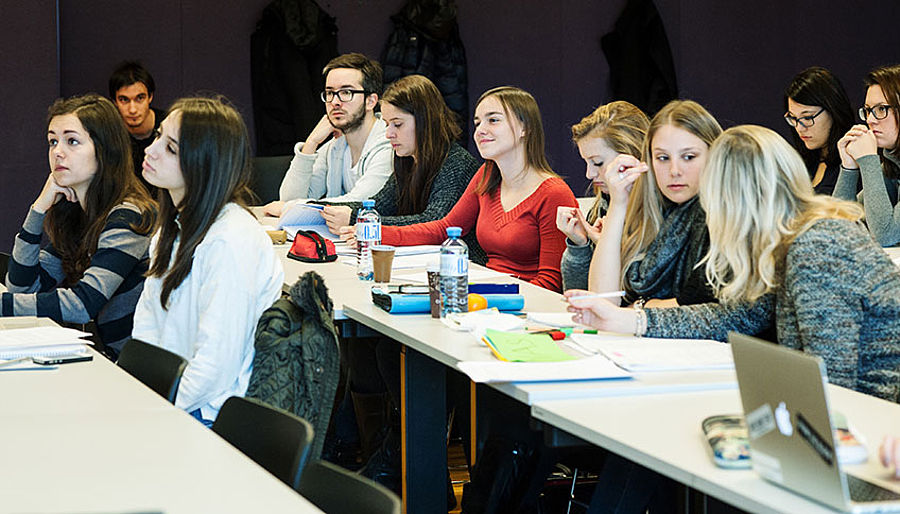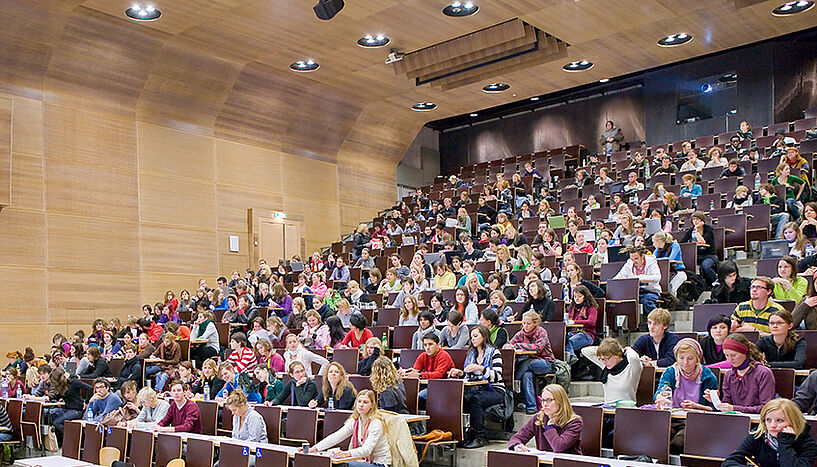What has changed in study law?
| 17. März 2016
Since October 2015 the University of Vienna has implemented new Statutes that also involve changes for students and teachers. (Photo credits: University of Vienna)
The new Statutes of the University of Vienna have been in force since 1 October 2015. This brought about a variety of changes for students and teachers. uni:view summarises these 13 changes.
The study law-related section of the Statutes of the University of Vienna includes university regulations that significantly influence university life. The changes have an immediate impact on registration procedures, courses and examinations. With the support of Studienpräses Peter Lieberzeit and Katharina Sonntagbauer, who is a legal expert in the Office of the Studienpräses, uni:view outlined the latest facts.
You can also find a detailed overview of the latest changes (PDF in German) on the Student Point website. The updated manual for teachers (PDF in German) offers teachers an overview of the current regulations as well as comprehensive information on teaching at the University of Vienna.
1. Information on courses has to be made available in the course directory
From now on, details on courses have to be made available in the course directory all at once so that students can obtain detailed information prior to the beginning of the course. The new Statutes thus require teachers at the University of Vienna to enter information on the course and examination content, the methods and the assessment criteria in Univis in due time. Katharina Sonntagbauer, legal expert in the Office of the Studienpräses, is happy to announce this change, which "creates transparency for students at an early stage".
2. Courses with continuous assessment require two or more partial achievements
In the case of courses with continuous assessment, you will already find information on the required partial achievements in the course directory. In courses with continuous assessment, student performance has to be assessed on the basis of two or more partial achievements, either in written or oral form. The final grade is calculated from the total points scored.

Students can register for courses online via the course directory and manage their registrations for examinations and courses via their U:SPACE account. (Photo credits: Barbara Mair/University of Vienna)
3. You can only attend courses if you are registered
Do not forget to register. If you do not register online in time (>>registration via the course directory and your U:SPACE account), you cannot attend courses with continuous assessment. Lecturers can no longer register students later on.
The applicable registration periods will be announced in the u:find course directory individually for each course. Moreover, you can obtain information on the registration periods for the individual degree programmes on the Student Point website. The directorate of studies is responsible for the registration procedure. Students can verify the current course registration status via their U:SPACE account (>> Studies > Course and examination registration system). You can find further information on the registration system on the Student Point website.
u:account and e-mail address for students
With their u:account, students have access to the IT services offered by the Vienna University Computer Center (ZID) (PDF brochure). As a student, you also get a personal e-mail address (a + student ID number@unet.univie.ac.at) that is not only convenient but also important during your studies
because you will receive a lot of important information on courses, office hours, examinations, admission to degree programmes or re-enrolment via your individual university e-mail account known as u:account.
Therefore, make sure to activate your u:account via U:SPACE and check your inbox.
You can also have the e-mails forwarded to another e-mail address. For study-related e-mails sent to teachers, the directorate of studies, the studies service center, etc., you should preferably use the u:account e-mail address so that each message can be clearly assigned to the respective student. This is important for data protection reasons.
4. If you fail to attend the first class without excuse, you will be deregistered
It is not enough to simply register for the course. If you fail to attend the first class without excuse, you will be deregistered. Places that become available will be assigned to students on the waiting list. You should also take your student ID card with you to the first class, as you are actually obliged to identify yourself upon request of the teacher.
"Students have to take action in order to advance in their studies. In addition to registering and deregistering, they have to carefully read potential announcements and listen carefully to what the lecturers say at the beginning of the semester. Students are also responsible for their own timetable. At a university with around 180 curricula, 7,000 teachers and up to 95,000 students, it is simply not possible to provide students with individual timetables", say Studienpräses Peter Lieberzeit and legal expert Katharina Sonntagbauer when talking about the university's expectations of students.
You did not get a place on your desired course?
Do not fear, the directorate of studies is here. If some students might not be able to finish their studies as initially planned, the directorate of studies can, in consultation with the teachers, raise the number of course participants or offer additional courses with continuous assessment. "Usually, efforts are made to ensure that students who did not get a place in an important course receive a place the following semester", says Peter Lieberzeit.

If you have any questions about lectures and examinations, you might not only get information from the lecturers but also from the studies service centers (SSC) and the studies service units (SSS). (Photo credits: University of Vienna)
5. You can only submit pending written contributions until 30 April or 30 September, respectively
For courses with continuous assessment, it is up to the lecturer to set a date for the expected partial achievements. According to the Statutes, pending written contributions may be submitted later – if permitted by the lecturer. However, the deadline to submit pending contributions has been standardised for both semesters as a result of the amendment of the University's Statutes. Since October 2015 students can only submit pending contributions until 30 April for the winter semester and until 30 September for courses in the summer semester.
6. Consequences of non-compliance with good academic practice and use of unpermitted material
Compliance with good academic practice, i.e. correct referencing and identification of the authors, is imperative for all written papers (seminar essays, bachelor's thesis, etc.) that make reference to research results of other academics. Serious violations of these rules result in non-assessment of courses with continuous assessment. The respective course will be marked with an "X" in the transcript of records. The same applies to the use of unauthorised materials.
7. If you do not deregister from a course in time, you will be assessed
Sometimes students cannot or do not want to attend a certain course with continuous assessment any longer. Usually, it is possible to deregister from a course up to two weeks after its start via U:SPACE (>>U:SPACE account > Studies > Course and examination registration system). Following the new regulation, students who do not deregister in time will still be assessed. According to the Statutes, if you drop out of a course with continuous assessment, you would thus receive the grade "insufficient" unless you can provide a legitimate reason (e.g. long-term illness).
In consultation with the directorate of studies, the teacher decides whether there were legitimate reasons for dropping out of the course. "This is not meant to annoy students or teachers", says Peter Lieberzeit when talking about the changes to the de-/registration procedure. “Considering increasing financial constraints, the University needs greater planning security. There is a general rule for such cases: Students can prevent conflicts and negative consequences for them if they talk to their teachers early enough and try to find a common solution.”
By the way:
Since 1 January 2016 there have also been introduced new regulations for the STEOP (introductory and orientation period). Students are again allowed four (instead of three) examination attempts during the STEOP. If you have not passed the STEOP examination after four attempts, you do not have to give up your studies yet. In such a case, students are suspended from the respective degree programme for one year but can eventually give it another try.
What is also new is that students can obtain 10 to 15 ECTS credits during seminars prior to the successful completion of the STEOP. However, please note: This option has to be explicitly indicated in the curriculum. In the curriculum you will also find information on the specific lectures that may be completed before meeting the actual requirements. As the development of curricula is very time-consuming, this is still to be accomplished.
8. In order to take part in an examination, you need to be registered
First things first: If you want to take part in an examination, you need to register for it via U:SPACE in time. (>>U:SPACE account > Studies > Course and examination registration system). Only students that have registered in time can be examined. Please remember not to confuse the optional registration at the beginning of the lecture with the registration for the actual examination.
The directorate of studies is basically responsible for the registration procedure and admission to examinations and also announces the examination dates and de-/registration deadlines. You should thus check the website of the respective directorate of studies.
You can also find general information on examination matters on the Student Point website.
Resitting an examination
You may resit an examination within 6 months even if you have already passed. If you resit an examination, the past result of the successful examination will be deleted from the transcript of records and replaced by the new one.

If you cannot make it to the examination on the scheduled date, it is important to announce this information via your U:SPACE account in time. (Photo credits: University of Vienna)
9. Exclusion as a result of non-attendance at the examination
It is not only important to register for an examination but also to deregister in time via U:SPACE (>> U:SPACE account > Studies > Course and examination registration system) should you not be able to attend the scheduled examination. Students who are pre-registered for an examination but do not show up without excuse are automatically excluded from the following examination.
The exclusion may be annulled if students can prove that there was a legitimate reason hindering them from deregistering in time. The relevant studies service center is responsible for such cases.
However, students who missed an examination on legitimate grounds have to hurry up: The studies service center has to receive the respective proof as soon as possible. Otherwise, it cannot be taken into account.
10. Completing an examination without valid admission for the semester in which the course was held
In some courses without continuous assessment (lectures), you may also take the examination in another semester. In any case, students should gather necessary information in advance and make sure to be properly admitted when they want to take the examination. Valid admission is required in order to be allowed to take an examination. This means that you have to be enrolled and you are currently not taking a leave of absence.
"In this regard, students benefit from the new Statutes. Until October they had to be admitted not only during the ‘course semester’, i.e. the semester in which the course was held, but also during the actual ‘examination semester’", says Studienpräses Lieberzeit.

At the self-service terminals you can print out payment forms for the tuition fees/Students’ Union fee as well as transcripts of record, confirmations of enrolment and other documents. Quick ways to pay the fees: eps or online banking. (Photo credits: University of Vienna)
11. You can apply for a leave of absence until the end of the extension period
The new Statutes also imply changes to the applicable periods for leave of absence and remission of tuition fees. You can now apply for a leave of absence until the end of the extension period. However, we recommend to file the application in time. In any case, you have to pay the Students' Union fee.
12. You can also apply for a remission of tuition fees until the end of the extension period
Not only the application for leave of absence but also the application for remission of tuition fees can be filed until the end of the extension period. Nevertheless, we advise students to hand in the application as soon as possible and not to forget to pay the Students' Union fee.
13. More transparency for grading in terms of university degrees
The grading scheme for bachelor's and master's degrees has become more transparent. Students whose thesis attained an "excellent" (1) grade and whose examination results achieved during their studies make up an average grade of 1.5 or better are awarded a "pass with distinction". For all other students, whose course results make up a grade of 1.5 or worse, the final classification indicated in the degree certificate will say "pass".
Stay on track – know where to find important study-related information
Regardless of the current changes, you will probably face study-related questions every now and then. The University's service units and our staff in charge of the degree programmes already provide various information to students on their websites. On the Student Point website you can get information on admission and studies and find out which organisational unit of the University of Vienna handles what kind of issues. uni:view outlined useful information on the start of the summer semester of 2016 that you can find here.
Studies service centers and studies service units
The studies service centers (SSC) and studies service units (SSS) are the central contact points for students for any questions concerning current studies. They provide advice on study law and organisational matters, such as registration for courses and examinations, recognition of grades or the submission that comes with the completion of a particular stage of the degree programme or the degree programme itself.
Especially with regard to the curriculum they are the key contact points. However, you might already find answers to many of your questions on the websites of the relevant SSC, SSS or the directorates of studies (SPL). You can also contact the directorate of studies and the SSC/SSS for special problems, e.g. problems occurring with your teachers. The counselling centre of the Austrian National Union of Students at the University of Vienna is another important contact point that is here to help you with study-related questions.
We would like to thank Studienpräses Peter Lieberzeit and Katharina Sonntagbauer, legal expert in the Office of the Studienpräses, for the detailed information on the current changes in study law.



